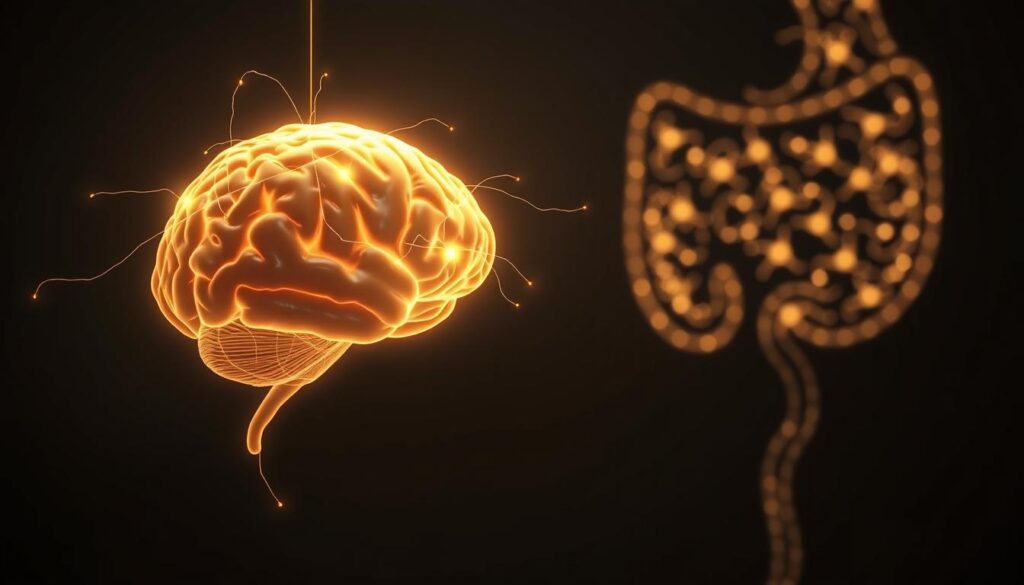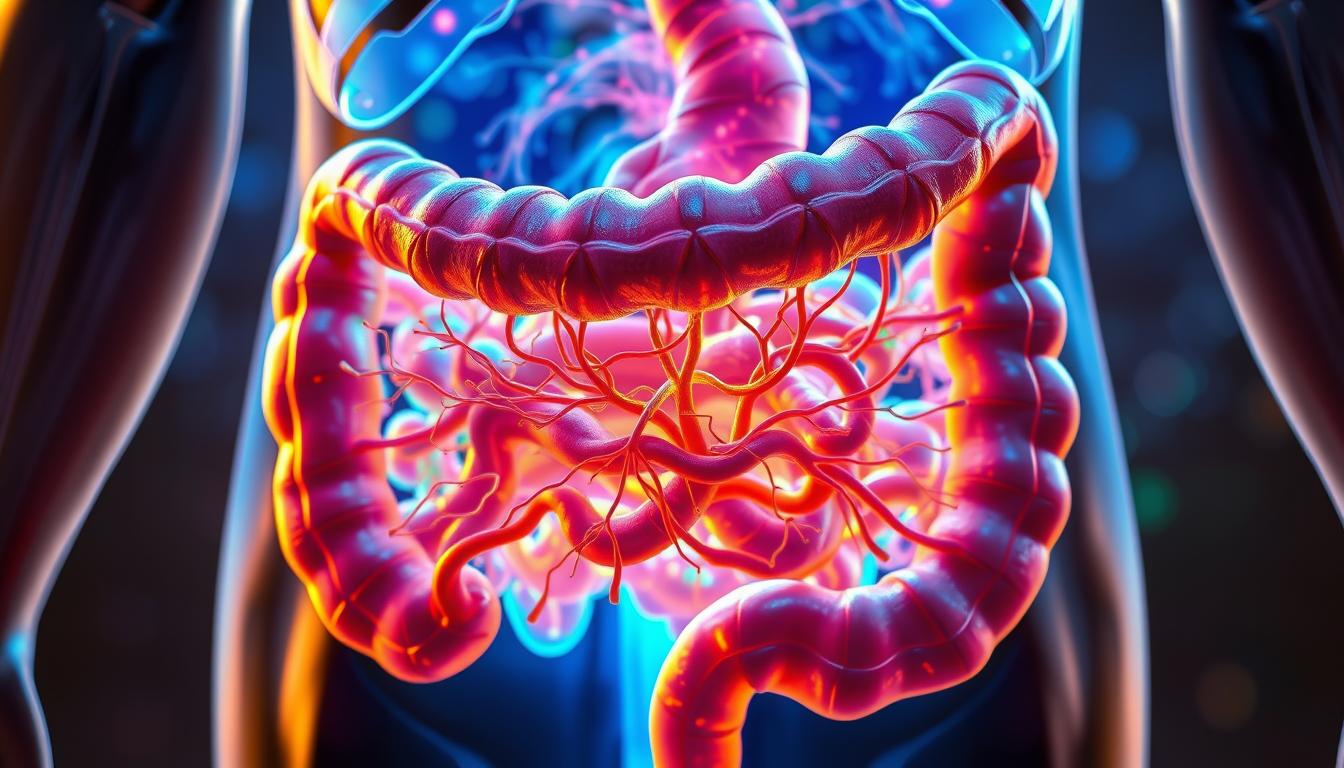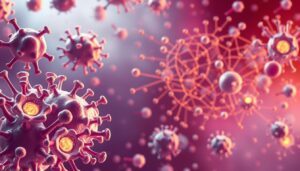Did you know that your gut contains over 100 million neurons, more than the number found in the spinal cord? This remarkable fact highlights the gut’s role as the “second brain” in your body1.
The enteric nervous system (ENS) is at the heart of this complex network, managing digestion, enzyme release, and blood flow with minimal input from the central nervous system. This system is a key player in the gut-brain axis, influencing both cognitive function and emotional well-being1.
Research shows that the gut produces almost all of the body’s serotonin, a neurotransmitter crucial for mood regulation2. This underscores the gut’s significant role in mental health, with studies linking gut bacteria to serotonin levels and mood disorders3.
Key Takeaways
- The gut’s enteric nervous system (ENS) functions like a “second brain,” managing digestion and influencing mood.
- The gut-brain axis is bidirectional, affecting both emotional states and physical sensations.
- Gut bacteria play a crucial role in serotonin production and overall mental health.
- Stress can trigger gut inflammation, leading to symptoms like nervous stomachs and cramping.
- Understanding the gut-brain connection offers new insights into treating conditions like anxiety and depression.
Introduction to Gut Health and Its Hidden Brain
Discover how your gut serves as a “second brain,” influencing digestion, mood, and overall well-being. The enteric nervous system (ENS) within your gut operates independently, managing digestion and communicating with the central nervous system4.
The gut-brain connection is vital for your health. The ENS produces neurotransmitters like serotonin, impacting your mood and mental state. This connection is so strong that gut conditions are linked to depression and anxiety, with biochemical signals playing a key role5.
- Digestion processes affect nutrient absorption and overall health.
- The ENS communicates with the brain via the vagus nerve, influencing emotions.
- Gut conditions are linked to depression through biochemical signals.
- The gut-brain connection impacts physical and mental well-being.
Understanding this connection is crucial for long-term health and disease prevention. The upcoming sections will explore these topics in depth.
Understanding the Enteric Nervous System and Gut-Brain Connection
Your gut is home to the enteric nervous system (ENS), which contains over 100 million neurons, making it the second largest concentration of nerve cells in the body after the brain6. This complex network plays a crucial role in digestion and overall well-being.
The Role of the ENS in Digestion and Beyond
The ENS acts as a “second brain,” managing digestion, enzyme release, and blood flow with minimal input from the central nervous system. It produces neurotransmitters like serotonin, which influence mood and mental state7. This connection is vital for health, linking gut conditions to depression and anxiety through biochemical signals8.
How the Vagus Nerve Bridges Your Gut and Brain
The vagus nerve is the primary pathway for gut-brain communication, transmitting signals that regulate digestion and emotional responses. It represents 75% of the parasympathetic nervous system, playing a significant role in maintaining homeostasis8.
| Component | Function | Impact on Health |
|---|---|---|
| Enteric Nervous System (ENS) | Manages digestion and produces neurotransmitters | Regulates mood and mental health |
| Vagus Nerve | Transmits signals between gut and brain | Influences emotional responses and digestion |
| Gut Microbes | Produce serotonin and dopamine | Linked to mental health conditions |
Research highlights the importance of maintaining a healthy ENS and gut microbiome. Probiotics and a balanced diet can enhance ENS function, while chronic stress and poor gut health can lead to inflammation and mental health issues7.
Gut Health, Cognitive Function, and Emotional Balance
Research shows that gut bacteria play a crucial role in producing neurotransmitters like serotonin, which directly impact mood, cognitive function, and emotional balance9.
Studies indicate that imbalances in gut microbiota can lead to mood disorders and diminished mental clarity10.
Understanding this connection is vital for improving mental and emotional health.
Influence of gut bacteria on mood and mental clarity
Gut bacteria are key contributors to neurotransmitter production, particularly serotonin, which affects mood and cognitive clarity9.
Serotonin and other neurotransmitters influence mood, cognitive clarity, and overall well-being10.
Research supports the role of gut bacteria in regulating the nervous system and stomach functions.
| Component | Function | Impact on Health |
|---|---|---|
| Serotonin | Regulates mood and appetite | Improves emotional balance and mental clarity |
| Gut Microbiota | Produces neurotransmitters | Supports cognitive function and mental health |
| Enteric Nervous System | Manages digestion and signals | Influences mood and overall well-being |
Addressing gut imbalances can significantly improve mental and emotional health10.
Cutting-edge research links gut microbial health to cognitive enhancement and overall well-being9.

The Second Brain in Your Belly: Unlocking the Secrets of Gut Health
Scientific research reveals that the gut-brain axis is a bidirectional signaling network connecting the enteric nervous system (ENS) and the brain, playing a crucial role in mental well-being11.
Gastrointestinal issues can trigger mood changes, highlighting the significant relationship between gut health and mental health11.
Approximately 60-70 million people in the United States are affected by digestive diseases, which can influence mood and emotional states11.
Implications for Managing Inflammation and Stress
The gut microbiome is essential for controlling inflammation and stress responses, impacting various health conditions. The gut-brain axis mediates these effects through hormonal and neural pathways.

Gut bacteria modulate inflammatory responses, with a diverse microbiome reducing the risk of chronic diseases by 40%12. This diversity is vital for overall health.
A dysregulated microbiome can lead to chronic stress, increasing the likelihood of gastrointestinal disorders by 50%12.
The vagus nerve plays a key role in reducing stress through gut signals, with studies showing improved mood and cognitive function in 60% of participants after dietary changes12.
Maintaining balance in the ENS and axis systems is crucial for mental and physical equilibrium. The gut produces 90% of serotonin, a neurotransmitter regulating mood11.
Therapeutic targets for conditions like depression and inflammation may lie in gut microbiome modulation, supported by advanced research11.
Lifestyle and Nutritional Strategies for Optimizing Your Gut-Brain Axis
Optimizing your gut-brain axis requires a holistic approach that combines dietary changes, stress management, and lifestyle adjustments. By focusing on these strategies, you can improve both your gut and brain health.
Enhancing Your Diet with Prebiotics and Probiotics
Diet plays a crucial role in maintaining a healthy gut microbiome. Incorporating foods rich in prebiotics and probiotics can significantly enhance microbial diversity. Prebiotics, found in foods like garlic and onions, help feed beneficial bacteria, while probiotics, found in yogurt and kefir, introduce live beneficial bacteria to your gut13.
| Nutrient | Source | Benefit |
|---|---|---|
| Prebiotics | Garlic, Onions, Asparagus | Feeds beneficial gut bacteria |
| Probiotics | Yogurt, Kefir, Sauerkraut | Introduces beneficial bacteria |
| Fiber | Fruits, Vegetables, Whole Grains | Supports gut health |
Research shows that a high-fiber diet can boost gut health by promoting the growth of beneficial bacteria13.
Stress Management, Exercise, and Quality Sleep Tips
Stress can negatively impact gut health, so managing it is essential. Mindfulness practices and regular exercise can help reduce stress levels. Additionally, getting 7-9 hours of quality sleep each night supports gut microbiota diversity and overall health14.
Regular physical activity, such as walking for at least 150 minutes a week, can enhance gut health and mental well-being14. Combining these strategies creates a balanced approach to optimizing your gut-brain axis.
Conclusion
Emerging research underscores the transformative impact of the gut-brain connection on overall well-being. Your gut, often referred to as the body’s “second brain,” plays a pivotal role in cellular activity, neurotransmitter production, and disease prevention.
The enteric nervous system (ENS) and gut-brain communication significantly influence neurotransmitter production, with 95% of serotonin being produced by gut bacteria15. This connection is crucial for managing anxiety and digestive disorders, as evidenced by studies showing that a healthy gut microbiome can reduce the risk of mental health issues by up to 50%16.
Dietary changes, stress management, and regular exercise are essential for mitigating these conditions. Incorporating prebiotics and probiotics, along with a high-fiber diet, can enhance gut health and neurotransmitter function17. Physical activity, such as walking 150 minutes weekly, boosts gut health and mental well-being16.
Recent studies reveal the gut’s influence on disease and cognitive change, emphasizing the importance of lifestyle strategies. By adopting informed nutritional and lifestyle choices, you can significantly improve your digestive system and gut-brain communication.
In conclusion, understanding and nurturing the gut-brain axis is vital for long-term health. Take charge of your well-being by making informed choices to support your gut-brain connection.
FAQ
What is the “second brain” in my body?
How does the gut-brain axis affect my mood?
What role do gut bacteria play in my health?
How can I improve my gut microbiome?
Can my diet impact my mental health?
How does stress affect my gut health?
What is the vagus nerve’s role in gut health?
Can gut health issues lead to immune system problems?
Source Links
- Gut instincts: unlocking your second brain – https://blog.swedish.org/swedish-blog/gut-instincts-unlocking-your-second-brain
- Unlocking the Secrets of Your Gut: How Digestive Health Impacts Your Energy, Mood, and Immunity – Progressive Health – https://progressivehealth.ie/unlocking-the-secrets-of-your-gut-how-digestive-health-impacts-your-energy-mood-and-immunity/
- It turns out we have a second brain — and it’s our gut – https://nationalpost.com/feature/gut-brain-axis-how-the-mind-is-connected-to-the-belly
- Unlocking the ‘gut microbiome’ – and its massive significance to our health – https://www.theguardian.com/society/2021/jul/11/unlocking-the-gut-microbiome-and-its-massive-significance-to-our-health
- Unlocking the secrets of the human gut microbiota: Comprehensive review on its role in different diseases – https://pmc.ncbi.nlm.nih.gov/articles/PMC11718612/
- The Brain-Gut Connection: Unlocking the Secret to Better Mental Health | Embodied Wellness Center, PLLC – https://embodiedwellnesscenter.com/the-brain-gut-connection/
- Gut Health and Mental Wellness: Discover the Powerful Connection – https://www.felixhospital.com/blogs/gut-health-and-mental-wellness
- Gut-Brain Connection: The Role of Your Diet in Boosting Mental Health – https://alcat.com/en/gut-brain-axis/
- What To Know About the Gut-Brain Connection – https://my.clevelandclinic.org/health/body/the-gut-brain-connection
- No title found – https://www.rupahealth.com/post/the-second-brain-unlocking-the-secrets-of-gut-health-for-cognitive-clarity
- Unlock the Secrets of the Gut-Brain Axis – https://www.austinholisticdr.com/blog/unlock-the-secrets-of-the-gut-brain-axis
- Unlocking the Secrets to Gut Health – https://zamaorganics.com/blogs/news/unlocking-the-secrets-to-gut-health?srsltid=AfmBOoo7Kar6QyH2MjC_gAwZf-2fJF4q51Z3lyu0mjCeOzqCiu4DqdeR
- Unlocking Secrets of the Gut-Brain Axis: Enhancing Mood and Cognitive Function through Probiotics & Prebiotics – Bliss Planet – Wellness For A Better World & Solutions for Climate Change – https://blissplanet.com/unlocking-secrets-of-the-gut-brain-axis-enhancing-mood-and-cognitive-function-through-probiotics-prebiotics/
- Unlocking the Secrets of The Gut-Brain Axis and Mental Health — Soul Space Tucson – https://www.soulspacetucson.com/blog//gut-brain-axis-mental-health
- Netflix’s ‘Hack Your Health: The Secrets of Your Gut’ Explores the Microbiome – https://www.everydayhealth.com/digestive-health/takeaways-from-netflixs-hack-your-health-the-secrets-of-your-gut/
- Unlocking the Secrets to Gut Health – https://zamaorganics.com/blogs/news/unlocking-the-secrets-to-gut-health?srsltid=AfmBOood2FJxUePtpxTJkZpeJNNA1SPVsOmlh4YbBzEaBkGy9ZG-vbSz
- The Second Brain Summary PDF | Michael D. Gershon – https://www.bookey.app/book/the-second-brain




